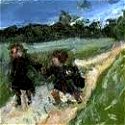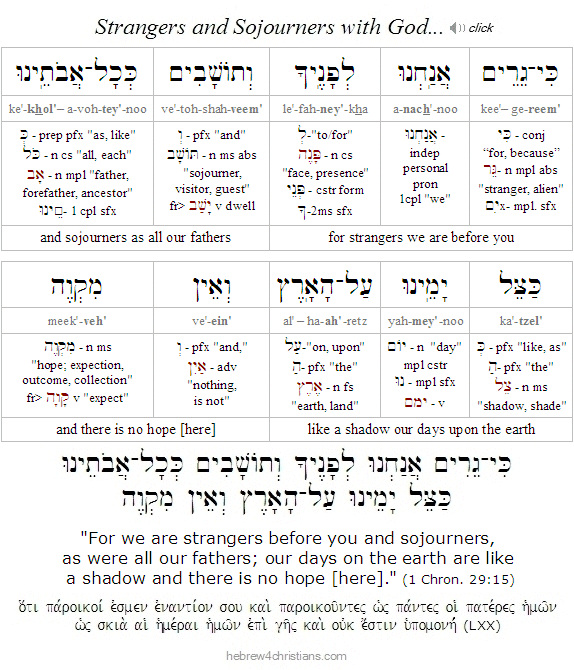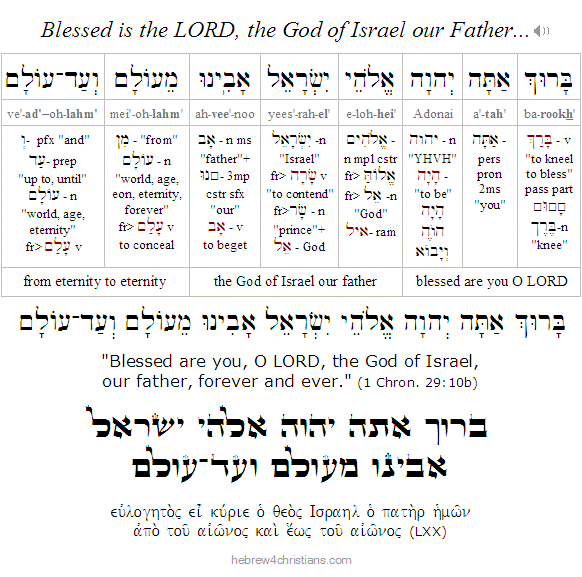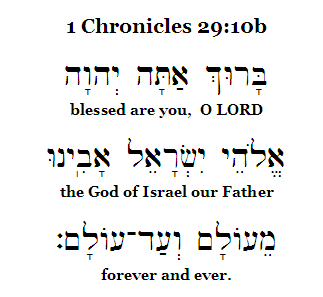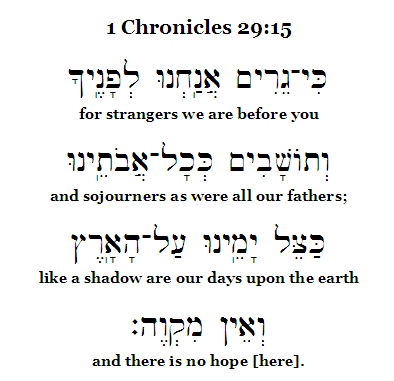|
|
|||||||||||||||||||||
 |
|||||||||||||||||||||
 |
|||||||||||||||||||||
|
|
||||||||||||||||||||||||||||
|
God's people are "strangers" in this world. They are literally estranged and live as "resident aliens" -- here, yet not here. Thus Abraham said to the sons of Chet: "I am a 'stranger and sojourner' (גֵּר־וְתוֹשָׁב) among you; sell me a burial site..." (Gen. 23:4), and King David likewise confessed: "For we are strangers with You, mere transients like our fathers (כִּי־גֵרִים אֲנַחְנוּ לְפָנֶיךָ וְתוֹשָׁבִים כְּכָל־אֲבתֵינוּ); our days on earth are like a shadow, without abiding" (1 Chron. 29:15). Life in olam hazeh (this world) is nothing but a "burial site," a graveyard, a shadowy place of passing that leads to olam haba, the world to come, and to God's glorious kingdom. We cannot find lasting hope in this world and its values; all that must be buried and surrendered to God. כִּי־גֵרִים אֲנַחְנוּ לְפָנֶיךָ kee-ge·reem · a·nach'·noo · le·fa·ney'·kha "For we are strangers before you, Hebrew Lesson:
This slight momentary affliction is preparing for us an eternal weight of glory beyond all comparison, as we look not to the things that are seen but to the things that are unseen. For the things that are seen are transient, but the things that are unseen are eternal. For we know that if the tent (σκηνος), which is our earthly home, is destroyed, we have a building from God, a house not made with hands, eternal in the heavens. For in this tent we groan, longing to put on our heavenly dwelling. If we are given grace to answer the call of Yeshua to "take up our cross," we presently become ger v'toshav. As gerim we confess that we are strangers in this present world, but as toshavim we believe that our labors are not in vain, and that our true citizenship is in heaven. Like father Abraham, we live in a foreign land as "strangers and sojourners," looking forward to the City of God (Heb. 11:9-10). בָּרוּךְ אַתָּה יהוה אֱלהֵי יִשְׂרָאֵל אָבִינוּ ba·rookh a·tah Adonai E·lo·hei Yis·ra·el a·vee'·noo "Blessed are You, LORD, God of Israel our father, Hebrew Lesson: May His Kingdom come speedily, and in our day, and may the LORD help us live today -- in this world -- as ambassadors and emissaries of the world to come. Amen.
The German "Reform movement" (Haskalah) began in the mid-nineteenth century. The goal of the movement was presumably to "enlighten" Jews and to help them assimilate into German culture. The structure of synagogue service was altered to resemble German Lutheranism (with organ music, men and women sitting together, etc.), and German - not Hebrew - became the language used in the liturgy. In addition, secular study and a "higher critical" understanding of the Scriptures was encouraged, and Jews were instructed to stop living isolated lives within the "ghettos," but rather to integrate as "full members of German society." This approach later culminated in the "motto" of the Reform movement: "Berlin is Jerusalem" (see the "Christian" corollary here). In other words, Berlin was just as good as Jerusalem, and the ideals of the Promised Land, the Torah, and the ultimate destiny of the Jewish people became allegorized (and therefore of merely symbolic significance).
|
|
Hebrew for Christians |
|||||
|
|||||
